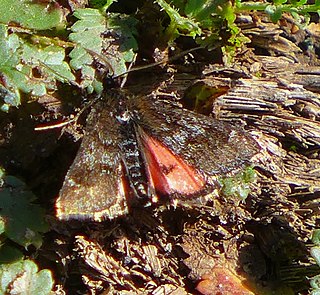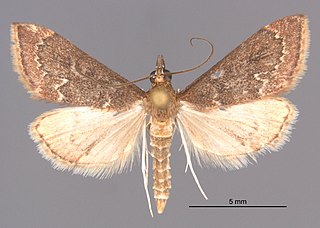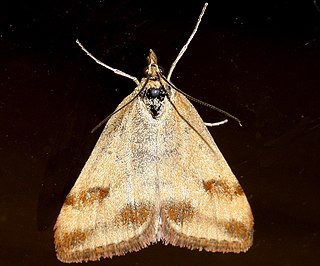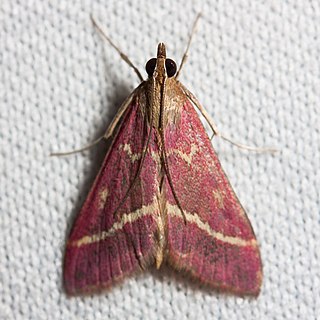
The Crambidae are the grass moth family of lepidopterans. They are variable in appearance, the nominal subfamily Crambinae taking up closely folded postures on grass stems where they are inconspicuous, while other subfamilies include brightly coloured and patterned insects which rest in wing-spread attitudes.

Niphograpta is a genus of moths of the family Crambidae. It contains only one species, the water hyacinth moth. It is native to the Amazon basin, but has been introduced in North America, Africa and Australia to control the spread of water hyacinth.

Pyrausta aurea is a moth in the family Crambidae. It was described by George Hampson in 1913. It is found from Nevada, southern Arizona, southern Texas and Mexico south at least to Costa Rica.
Pyrausta antisocialis is a moth in the family Crambidae. It was described by Eugene G. Munroe in 1976. It is found in North America, where it has been recorded from New Mexico and Arizona.

Pyrausta arizonicalis is a moth in the family Crambidae. It was described by Eugene G. Munroe in 1976. It is found in North America, where it has been recorded from Texas, New Mexico and Arizona.
Pyrausta cardinalis is a moth in the family Crambidae. It was described by Achille Guenée in 1854. It is found in Florida, Cuba, the Dominican Republic and on the Virgin Islands and Puerto Rico.

Pyrausta corinthalis is a moth in the family Crambidae. It was described by William Barnes and James Halliday McDunnough in 1914. It is found in Mexico and the United States, where it has been recorded from California and Arizona.

Pyrausta dapalis is a moth in the family Crambidae. It was described by Augustus Radcliffe Grote in 1881. It is found in western North America, where it has been recorded from California and Oregon.

Pyrausta homonymalis is a moth in the family Crambidae. It was described by Eugene G. Munroe in 1976. It is found in North America, where it has been recorded from Missouri to Virginia, Mississippi and Florida, west to Texas.

Pyrausta inornatalis, the inornate pyrausta moth, is a moth in the family Crambidae. It was described by Charles H. Fernald in 1885. It is found in United States, where it has been recorded from Arizona, California, Florida, Arkansas, Kansas, Louisiana, Missouri, Oklahoma, Tennessee and Texas. It is also found in Mexico.

Pyrausta lethalis, the lethal pyrausta moth, is a moth in the family Crambidae. It was described by Augustus Radcliffe Grote in 1881. It is found in North America, where it has been recorded from California to southern Nevada, southern Arizona and Texas.

Pyrausta perrubralis is a moth in the family Crambidae. It was described by Packard in 1873. It is found in North America, where it has been recorded from British Columbia, California, New Mexico, Oregon and Washington.

Pyrausta pseudonythesalis, the Shasta pyrausta moth, is a moth in the family Crambidae. It was described by Eugene G. Munroe in 1976. It is found in North America, where it has been recorded from California, Nevada, Arizona, New Mexico and Texas.

Pyrausta roseivestalis is a moth in the family Crambidae. It was described by Eugene G. Munroe in 1976. It is found in North America, where it has been recorded from California and southern Arizona.

Pyrausta rubricalis, the variable reddish pyrausta moth, is a moth in the family Crambidae. It was described by Jacob Hübner in 1796. It is found in North America, where it has been recorded from Illinois to New York, south to Florida and Louisiana. It is also reported from the west coast, from southern California to Washington. The wingspan is about 15 mm and adults have been recorded on wing from March to October.

Pyrausta semirubralis is a moth in the family Crambidae. It was described by Alpheus Spring Packard in 1873. It is found in North America, where it has been recorded from southern British Columbia to California, Nevada, Colorado and Arizona. The habitat consists of coastal areas, reaching inland up to altitudes of about 9000 ft.
Pyrausta tatalis is a moth in the family Crambidae. It was described by Augustus Radcliffe Grote in 1877. It is found in North America, where it has been recorded from California to Texas and Oklahoma.

Pyrausta tyralis, the coffee-loving pyrausta moth, is a moth in the family Crambidae. It was described by Achille Guenée in 1854. It is found in the United States, where it has been recorded from New York to Illinois and from Florida to Arizona. It is also found from Mexico to Venezuela, as well as on the West Indies.

Pyrausta unifascialis, the one-banded pyrausta, is a moth in the family Crambidae. It was described by Alpheus Spring Packard in 1873. It is found in North America, where it has been recorded from Quebec west to British Columbia, south to Arizona and California. The habitat consists of forest openings, clearings and fields.

Pyrausta volupialis, the volupial pyrausta moth, is a moth in the family Crambidae. It was described by Augustus Radcliffe Grote in 1877. It is found in North America, where it has been recorded from Oklahoma, Utah, Texas, Colorado, New Mexico, Arizona and California to Chiapas, Mexico.

















